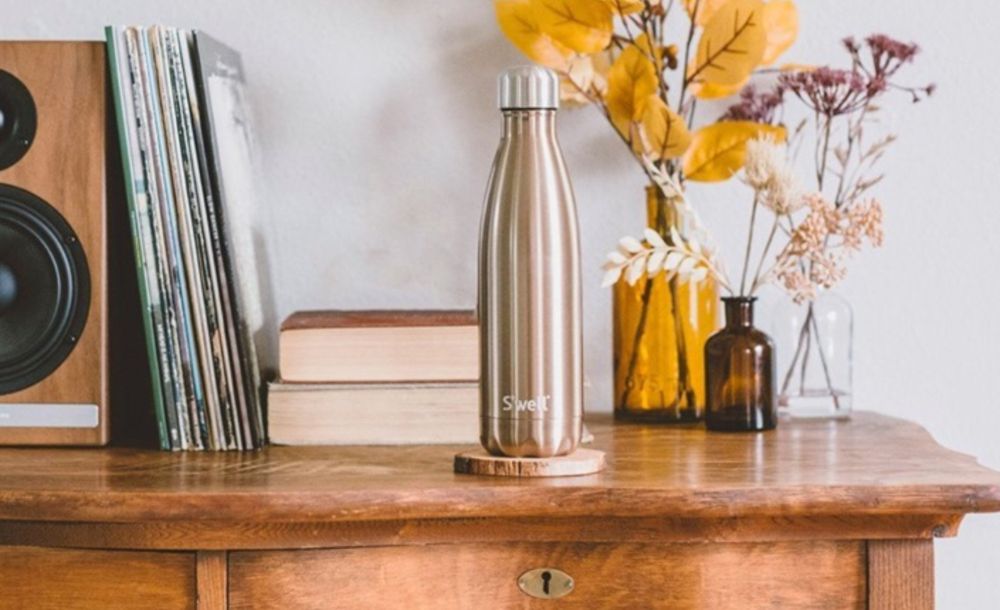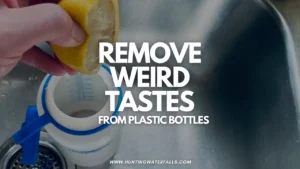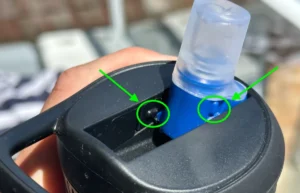I love drinking lemon water in my S'Well bottle because it keeps me hydrated and helps me digest after a big meal. It's more interesting to drink water with a bit of lemon in it but what impact does the acidic lemons have on my stainless steel S'Well bottle?
Is it safe to use lemon juice in a S'Well bottle or will it damage it?
Yes, you can put lemon in a S'Well bottle. While lemon is acidic, S'Well bottles are anti-corrosive and capable of withstanding lemon juice, especially if it's watered down.
While lemon shouldn’t impact your bottle, some users have told me that adding lemon water to their stainless steel bottle causes a metallic taste in their mouths.
So if you like lemon with your water then go for it – just make sure to wash your bottle well everyday.
Will Lemon Damage My S’Well Bottle?
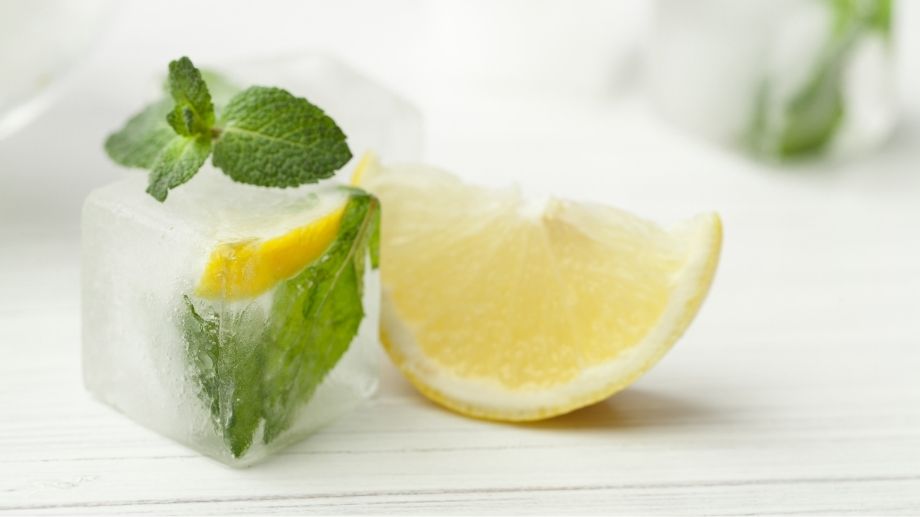
Lemon contains corrosive citric acid. Lemon juice has a pH between 2-3 which makes it 100,000 times more acidic than water (according to healthline.)
If presented to metal for an extended period, it can begin to break down the metal and cause micro-particle leaching.
If this happens, it will start to eat away at your bottle, causing you to ingest very small amounts of metal.
S’Well Bottles are made using 18/8 stainless steel, which prevents oxidation. This means that the bottles are resistant to breaking down – but it doesn't make them completely immune.
There is little data on whether or not lemon will damage your bottle or cause metal leaching but there is some speculation that it might.
There is a comment on an online forum thread that is apparently from Robert Seals (not verified) who started the competing brand Klean Kanteen. He says:
A. I am Robert Seals the inventor of Klean Kanteen which started the stainless vs plastic revolution; I sold the company years ago. I had the bottles tested back then because as a metal worker I was concerned about electropolishing, which I did not trust. Using an acid equivalent to lemon juice it was found to leach nickel over the acceptable amount allowed by FDA standards. I was concerned enough to print FOR WATER ONLY on the bottles as the same tests showed no detectable metal when water was used.
Electro polishing is not the way to passivate any food container. The old fashioned polishing method is by far is the best way to seal the metal but it's too labor intensive for production. The public is being duped on this one. Robert Seals
However, I don't know whether or not S'Well uses electropolishing or something else to passivate their bottles. So I'm not sure if this comment applies to S'Well bottles as well as Klean Kanteen bottles.
It's also important to note in the above example that the test was done with an acid equivalent to lemon juice. However, I would imagine almost no one is drinking straight lemon juice from their S'Well bottle.
They are likely just putting a piece of lemon or a squirt of lemon juice in a bottle completely full of water. This is going to make the overall combination much less acidic that straight lemon juice so the leaching would likely be a lot less.
I did do a deep dive into whether or not stainless steel bottles are safe to drink out if and there I looked into the nickel issue a bit deeper.
This report on Nickel gave some very interesting insights:
There is no experimental evidence that nickel compounds are carcinogenic when administered orally or cutaneously.
(Cutaneously relates to the skin as well as orally when it is consumed through the mouth but not inhaled into the lungs)
However, nickel is a well known cause of allergic contact dermatitis (ACD).
This clinical article tells us that “stainless steel cookware is another potential dietary nickel source” and that could also apply to your water bottles. So if you are having issues with allergic contact dermatitis then maybe don't use lemon in your water and maybe even consider switching to glass bottles instead.
How Long Can I Leave Lemon Water in a S’Well Bottle?
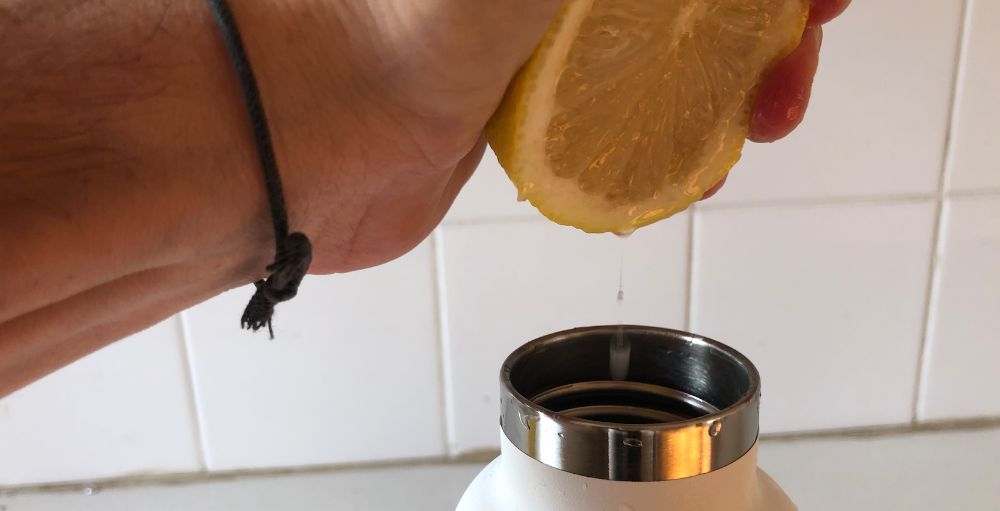
When left for extended periods, lemon will naturally corrode anything it comes in contact with – not to mention the fact that it'll cause bacteria to grow which will give your water a funky taste and potentially make it unhealthy to drink from.
One of the benefits of S'Well bottles is they are vacuum insulated so your lemon water will stay cold for longer, especially if you put ice in it, and this can slow the growth of bacteria.
You can leave lemon in stainless steel S'Well or Hydro Flasks for hours at room temperature and even longer if the water was refrigerated.
The lemon will stay fresh and more of the nutrients from the fruit will soak into your water making it even better for you.
If you’re trying to test the theory, it’s believed that you can leave the lemon in your bottle for up to four weeks at room temperature before it may start corroding the inside of the S’Well Bottle.
But you should NOT drink 4 week old lemon water! Yuk
Does Lemon in S’Well Bottles Affect the Taste of My Water?

There are quite a few people who say that adding lemon to their water in stainless steel bottles makes them notice a metallic taste in their drink.
There are no studies I could find on whether or not this is objectively true, but it does seem possible that lemon juice could make your drink taste more metallic due to small amounts of metal being leached into your drink.
Your bottle may also just need a good clean.
It’s important that you clean the bottle with soap and water before using it for the first time. There is likely a film on the inside that you’ll want to wash off.
- Rewash it with soap, water, and an abrasive bottle washing tool
- Add one teaspoon of baking soda to the bottle with water and shake it up
- Consider adding a teaspoon of vinegar to water and shake it in the bottle
These three methods should remove the metallic taste from your bottle and make your drinking water more enjoyable.
Keep in mind that putting ice into your lemon water can also impact the taste – especially if your ice tastes bad because it's absorbed odors from your freezer.
Will the Lemon Smell Stick to My S’Well Bottle?
While we might love the scent of lemon water when we’re drinking it, if you plan to put something else in the bottle, you might want to remove the smell.
Adding a bit of vinegar to your bottle with warm water can remove the smell and taste of lemon.

